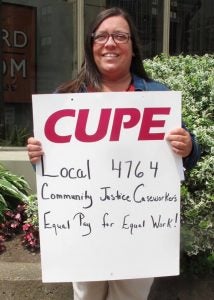The following Letter to the Editor appeared in the Chronicle Herald on July 10, 2018.
Nova Scotians should be proud of our status as a trailblazer in the field of restorative justice. In November 2016, we added adult restorative justice to the legislative framework, to media fanfare across the country. We are the only province where anyone ages 12 and up can, under the correct circumstances, be diverted out of the criminal justice system into a healing restorative justice process.
What we should be less proud of is that zero extra dollars and zero extra staff have been added to restorative justice since the addition of adults to the program. At the agency I work, caseload has jumped almost 150 per cent.
Working as a caseworker in restorative justice is not for the faint of heart. We deal daily with trauma and pain. We have the privilege of witnessing a healing process in real time, but it requires skills and expertise to support victims and offenders in reaching a resolution so that harm in the community can be repaired.
Restorative justice, based on Indigenous practices of healing, ensures everyone has a voice in making things right. We help curb recidivism. We address root causes of conflict. We take a load off of the traditional court system and increase victim satisfaction. We strengthen communities one circle at a time, and we have the data to show that this is working.
But the reality is that we do this work because we love it, not because it adequately compensates us. The challenges of the work and extreme caseload results in a staff turnover rate of 100 per cent some years. Experienced and skilled caseworkers leave for other positions. The disruption hurts clients and the program. Our clients deserve experienced caseworkers and continuity of service.
For a job that requires a university or advanced degree, restorative justice caseworkers earn $37,000 a year. Our pay does not change with years of experience; it remains flat at a rate that, after deductions, is the equivalent of $14.40/hr. This pay rate is ultimately determined by the Nova Scotia Department of Justice through its funding formula. This same formula excludes us from the pension and benefits other provincial employees receive.
A recent comparison analysis concluded we do 90 per cent of the work of probation officers, who average $66K annually here. As members of CUPE Local 4764, we recently concluded an unsuccessful conciliation session where our request for wage parity was dismissed. We didn’t even get a wage proposal from our employer.
 We are now waiting for a conciliator’s report, after which we will be in a position to strike — something none of us wants to do. When it’s already a struggle to get by, the prospect of striking is extremely stressful. Not to mention that it will leave our clients (and important court dates) hanging in the process. But funding hasn’t changed for us in over 12 years, and something needs to change. We deserve equal pay for equal work. We deserve justice.
We are now waiting for a conciliator’s report, after which we will be in a position to strike — something none of us wants to do. When it’s already a struggle to get by, the prospect of striking is extremely stressful. Not to mention that it will leave our clients (and important court dates) hanging in the process. But funding hasn’t changed for us in over 12 years, and something needs to change. We deserve equal pay for equal work. We deserve justice.
Denise Russell is a caseworker, Community Justice Society.

